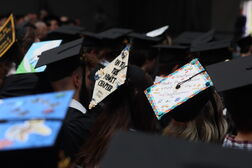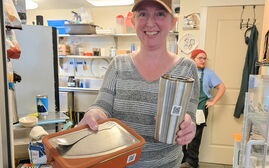Bar Harbor college supports nearly $17M in economic impact on MDI region
 Photo / Courtesy College of the Atlantic
Over the past four years, capital projects added $29.2 million in cumulative value to the regional economy and supported more than 300 construction-related jobs.
Photo / Courtesy College of the Atlantic
Over the past four years, capital projects added $29.2 million in cumulative value to the regional economy and supported more than 300 construction-related jobs.
College of the Atlantic supported an estimated $16.9 million in economic output to the region across direct, indirect and induced activities, according to an analysis by RKG Associates Inc. in collaboration with the Musson Group.
Combined operations, wages, and student spending at the Bar Harbor college — with full-time enrollment of 353 students and a focus on a field it calls “human ecology” — generated approximately $1.2 million in state and local tax revenues, plus another $108,987 in direct property tax payments.
Over the past four years, COA’s capital projects — including investment in new construction using passive house principles — have added $29.2 million in cumulative value to the regional economy and supported more than 300 construction-related jobs.
Examples of businesses and organizations started include Havana and other restaurants by 1994 alumnus Michael Boland, Diver Ed's Dive-In Theater by Eddie Monat, class of 1988, and Community School for Place-Based Education by Jasmine Smith, class of 2009. Michael Zboray, a 1995 alumnus, is superintendent of the local regional school system.
Taken together, institutional spending, employment, capital projects and the activities of students and visitors strengthen and create local businesses, support jobs and attract new resources to the community, creating a ripple effect that benefits residents, organizations and the broader Maine economy, according to the analysis.
Findings
- The average COA student spends about $258 per month at local businesses, amounting to an estimated $744,000 annually.
- Faculty and staff contribute year-round through local spending, volunteering and civic leadership, and bring grants, expertise and cultural programming,
- Alumni, faculty and staff who remain in the region often start businesses, lead organizations and strengthen local institutions.
- Many alumni remaining in Maine apply their education in environmental science, agriculture, education and other professional fields, founding businesses and contributing to the workforce.
Founded in 1969, College of the Atlantic last month topped the Princeton Review's “Guide to Green Colleges” for the 10th year in a row.













0 Comments